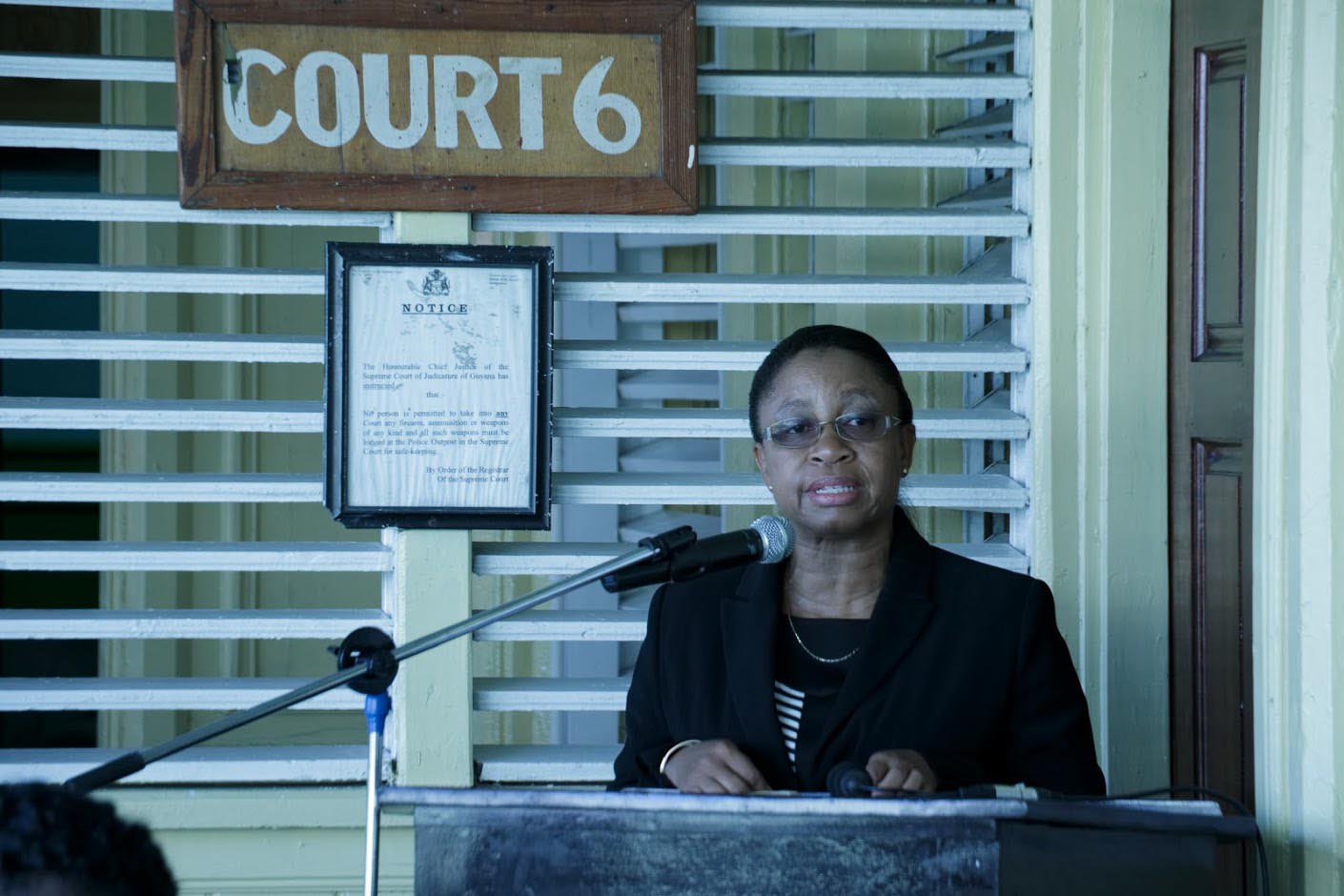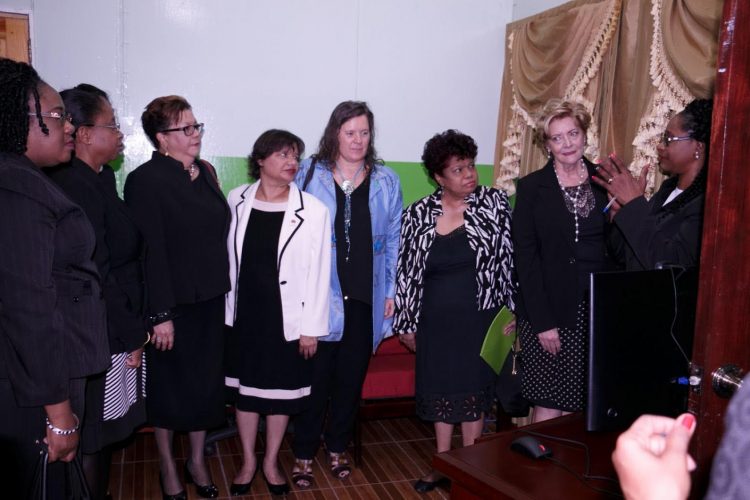Moments after opening the first ever Sexual Offences Court in the Caribbean, the local judiciary yesterday launched the Model Guidelines for Sexual Offence Cases, which are to be implemented in the Caribbean region.
The guidelines are an initiative of the Judicial Reform and Institutional Strengthening (JURIST) Project, funded by the Government of Canada, and executed by the Caribbean Court of Justice (CCJ).
Speaking at the launch at the Pegasus Hotel, Justice Maureen Rajnauth-Lee, of the CCJ, noted that the guidelines form part of a comprehensive approach towards improving the management of sexual offence cases and the treatment of witnesses and survivors of sexual offences.
Justice Rajnauth-Lee, who also chairs the Regional Sexual Offences Advisory Committee, said the guidelines are aimed at providing guidance to justice sector stakeholders, including judicial officers, attorneys, prosecutors, police and health and social care providers during the lifecycle of a case.
They are expected to set the minimum acceptable standards for the provision of quality service and support to the survivors of sexual assault and equitable justice to all those involved.
The guidelines are intended to provide guidance to Magistrates’ Courts, High Courts and Supreme Courts to ensure that re-victimisation of survivors is minimised as they receive support services to facilitate them being able to give the best quality evidence to the court, while ensuring adequate safeguards for the rights of defendants.
They take into account principles to be followed in the pre-trial court process, the trial process, and offender’s rehabilitation and management.
The speakers at yesterday’s launch all noted that the guidelines cannot be seen as the final goal, as success lies with its implementation.
In a note in the model guidelines document, President of the CCJ, Sir Dennis Byron, expressed hope that the guidelines will be adopted by all the countries in the region, and that their implementation will result in increased public confidence in the justice system as regards the handling of sexual assault cases.
He said that there must be improved responses to survivors that will enable their full participation in the justice system, increase offender accountability and reduce secondary victimisation.
Additionally, he said there must be a trained and skilled cadre of cross-sectorial professionals, including judges, court personnel, police and attorneys to efficiently respond to sexual assault cases, survivors and witnesses; and speedy adjudication of cases and reduction of case backlogs over time.
Meanwhile, speaking at the launch yesterday, acting Chancellor Justice Yonette Cummings-Edwards expressed gratitude to the JURIST Project in crafting the guidelines, which she noted will play a vital role in improving the delivery of justice in sexual offence cases.
She said that with sexual violence being an issue in the Caribbean, the guidelines will strengthen the responses of judiciaries, highlighting those instances where such cases are mishandled, be it at the investigative or trial stages or even after.
For her part, Minister of Social Protection Amna Ally, who was also present at the launch, noted her government’s commitment in working to improve the delivery of justice in sexual offence cases.
She described the launch and the opening of the specialist court as groundbreaking. Noting the upsurge in sexual and domestic violence over the years, the Minister said that strategic intervention and policy guidelines, such as those launched, are needed.
According to Ally, the launch is timely, as Guyana is in the process of conducting a comprehensive review of the national plan of action for the implementation of the Sexual Offences and Domestic Violence Act.
She said, too, that the government has resuscitated the National Task Force for the Prevention of Sexual Violence.
Ally said that her ministry has taken significant strides in the implementation of a responsive mechanism, which seeks to hold several categories of practitioners and professionals and all stakeholders accountable and to improve the quality of care and service provided to victims.
High Commissioner of Canada to Guyana Lilian Chatterjee also spoke and she said that her government was extremely pleased to be associated with financing the project, and making the launch of the guidelines possible.
Noting the work of the JURIST Project, Project Director Dr. Penny Reedie said that it is funded under a Cdn $19 million arrangement with the Government of Canada, implemented on behalf of Global Affairs Canada and the Conference of the Heads of Judiciary of CARICOM, by the CCJ appointed by the Conference as its Regional Executing Agency.
She said the Project is aimed, among other things, at modernising court systems and to equip judicial officers and court staff with the skills and competencies necessary for delivering justice in a fair manner.
Adequate safeguards
The guidelines, which are the first of their kind, seek to take a comprehensive, collaborative and systemic approach towards addressing the investigation, prosecution and adjudication of sexual assault cases.
During the pre-trial court process, they seek to provide guidance for the court to ensure that adequate safeguards are in place for the protection and care of the survivor and vulnerable witnesses. In this regard, attention is paid to survivor care and protection, and case management in both the Magistrates’ and High courts.
According to the guidelines, where the defendant has been charged with rape or other indictable sexual offences, he or she will usually be brought before the Magistrate’s Court “the next day or within 48 hours for a remand hearing.”
Added to that, the guidelines stipulate that the magistrate should inquire when the defendant was charged, to determine if the timelines required for bringing persons before the court are being adhered to, and may ask such questions as may be appropriate to determine the general condition of the defendant.
The guidelines for the trial process, meanwhile, are expected to provide standardised directives for the adjudication of sexual assaults to ensure that the best evidence possible is presented in a way that protects the rights of complainants and defendants, as well as to ensure that re-traumatisation of the complainant is minimised.
Noting that legislation usually provides that some or all of the evidence in sexual offence cases be taken in-camera, unless otherwise directed by the court, the guidelines stipulate that where there is no such provision, the court has a discretion to hear certain proceedings in-camera, and in exercising this discretion the court will balance the interests of the complainant and other vulnerable witnesses with the concept of open justice.
As regards cross-examination, the guidelines also require that this be done via live link, with or without playing a pre-recorded video as evidence.
The guidelines also note that some jurisdictions have legislative provisions for a sex offenders’ register and they recommended that the register contain primarily convictions of serious sexual offences and non-serious sexual offences as may be required by the public interest when such crimes are prevalent or in the case of serial offenders.
In the area of the offender’s rehabilitation and management, which caters for both adult and child offenders, the guidelines say that the court may consider the opportunities and potential for rehabilitation whenever possible. It, however, notes that some sexual offenders have a very high rate of recidivism and not all cases are appropriate for rehabilitation. “The interests of justice must be weighed against the likelihood of reoffending and whether rehabilitative intervention may reduce the likelihood,” they note.








